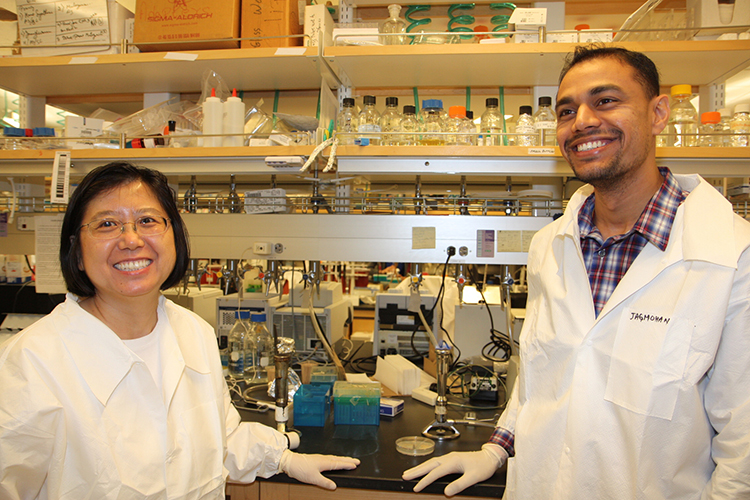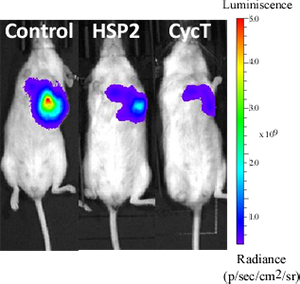
Research in the School of Natural Sciences and Mathematics at UT Dallas has shown that heme, a central molecule in oxygen utilization, is implicated in the growth and proliferation of lung cancer cells.
Dr. Li Zhang, professor of biological sciences, and her research team previously found that cells of the most common type of lung cancer – non-small cell lung cancer (NSCLC) – consume significantly more oxygen than normal cells. The lung cancer cells outpace their normal counterparts in synthesizing and importing the critical chemical called heme, which helps transport and store oxygen. The elevated levels of oxygen and heme fuel tumor growth and progression.
Last year Zhang, the Cecil H. and Ida Green Distinguished Chair in Systems Biology Science, was awarded her second $900,000 grant from the Cancer Prevention and Research Institute of Texas (CPRIT) to further her investigation. Currently, she is using advanced imaging techniques on animal models to determine whether drugs that target heme synthesis and uptake can be used to suppress lung tumors, improving the effectiveness of chemotherapy, radiotherapy and immunotherapy.
“We aim to illuminate the mechanisms by which targeting heme and oxidative phosphorylation, alone or in combination with current therapies, influence lung tumor growth,” Zhang said in her grant proposal to CPRIT.

Oxidative phosphorylation, or OXPHOS, is the process in which adenosine triphosphate (ATP) is formed.
“We have made major inroads into the development of imaging techniques to study lung tumors and new drugs to effectively inhibit OXPHOS and suppress lung tumors in vivo (in living organisms). We will demonstrate in 3D the dynamic responses of representative types of NSCLC tumors to these drugs to determine the degree to which they alleviate tumor hypoxia and normalize tumor vasculature [blood vessels] and oxygenation,” it reads.
CPRIT was created in 2007 to deliver on the promise to accelerate advancements in cancer prevention and cures. To date, CPRIT has awarded $2.6 billion in grants to Texas research institutions and organizations through its academic research, prevention and product development research programs.
Zhang has received two awards from CPRIT’s Individual Investigator mechanism, said Chris Cutrone, senior communications specialist with CPRIT.
![Representative tumor images of spatial distribution of oxygen saturation [sO2 (O2)] after the oxygen challenge and the amplitude of signal change (ΔsO2, which is an indicator of tumor vascular function) for each treatment group from breathing air to breathing 100% oxygen. Oxygen saturation was detected using a noninvasive imaging modality, called](https://nsm.utdallas.edu/files/2021/04/image005-300.png)
“Grants are awarded based on a peer-review process. We rely on highly distinguished scientists, health professionals, product development entrepreneurs and patient advocates who live and work outside of Texas to objectively review all grant proposals,” he said.
Having made game-changing discoveries, Zhang is now ready to take her research to the next level – making it her business.
She has founded a company called HemePro Therapeutics, which aims to turn heme-sequestering peptides (HeSPs) and proteins into cancer-fighting drugs.
“We have collected comprehensive experimental data from three kinds of mouse tumor models demonstrating that HeSPs effectively suppress lung tumors via multiple mechanisms,” Zhang said. “What is so exciting about our therapy is that there has been no detectable toxicity on lung cells, blood and liver functions.”
This contrasts with chemotherapies and other targeted treatments that often have devastating short- and long-term side effects.
“Heme-sequestering peptides target genetic alterations: altered heme needs and tumor bioenergetics. And because they effectively inhibit tumor respiration and growth, it is highly likely that they can be combined with other therapies to dramatically improve outcomes of treatment for lung cancer and other drug-resistant cancers,” Zhang said.
Representative histological (H&E) images of control tumors and tumors treated with HSP2 or CycT. Tumors are marked with light blue outlines. Montage (scale bar: 1 millimeter) and 10X (scale bar: 100 micrometer) images of the H&E sections are shown. The dark blue rectangles in montage denote the regions shown in 10X.
To start clinical trials, Zhang will need to obtain FDA approval.
“The first step is gaining Investigational New Drug (IND) status so that we can begin testing heme-sequestering peptides in clinical trials. For an IND application, one must show safety and efficacy. We already have shown potent efficacy in three different mouse models, so now we need to conduct toxicology studies in animal models. We do not anticipate our drug to have toxicity as we have observed no detectable toxicity on normal lung cells, blood or liver function in mice thus far,” she said.
Zhang said the Office of Technology Commercialization at UT Dallas has filed a patent application for heme-sequestering peptides. HemePro Therapeutics holds exclusive rights to the patent.
“Due to the urgent need for innovative cancer therapies, our goal is to start clinical trials and bring this therapy to patients as soon as possible,” Zhang said.
Lung cancer is the leading cause of cancer deaths in the United States. More Americans die from lung cancer every year than breast, pancreatic and colorectal cancers combined.
“We are pursuing philanthropists and donors who believe in our vision and want to make a real impact,” Zhang said. Those interested in supporting HemePro Therapeutics can contact the company at IR@hemetx.com.
Help us leave the planet a better place for future generations. Your support for the School of Natural Sciences and Mathematics funds scientific discoveries with real-world applications, student and faculty recruitment, and academic scholarships.